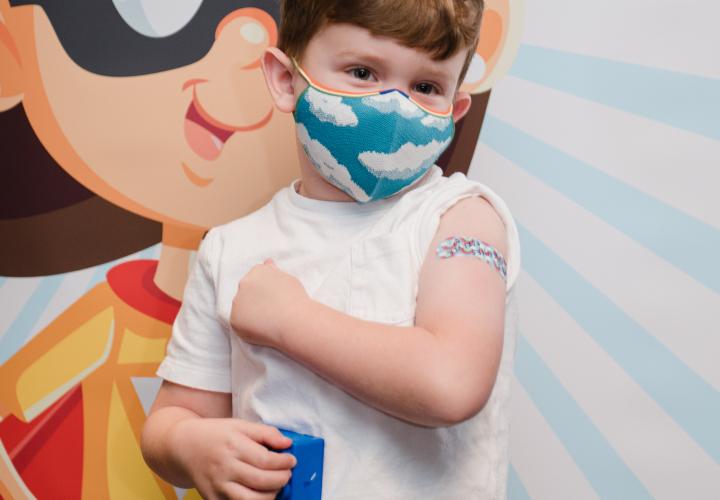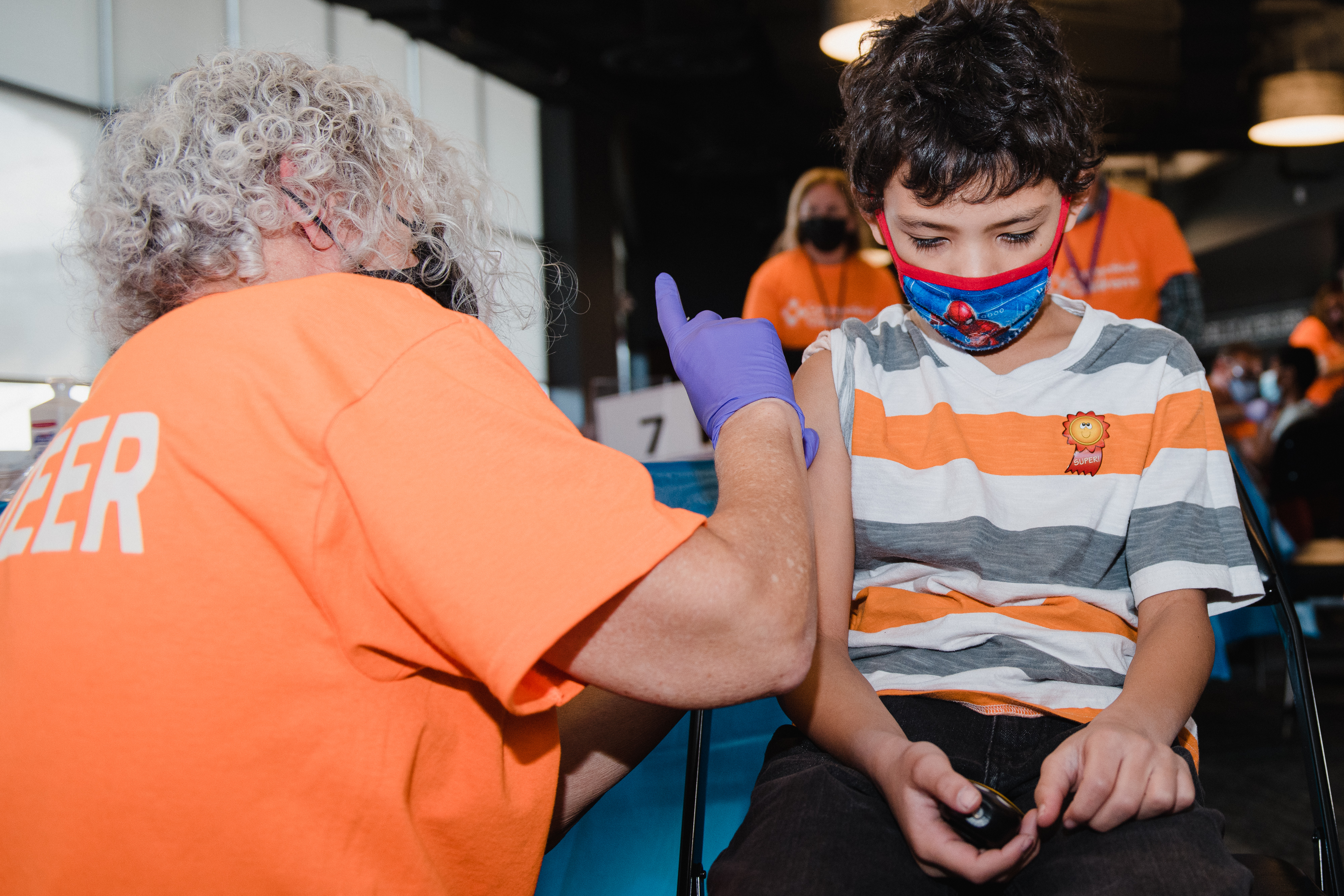It’s the exact same vaccine, made with the same mRNA technology. But it’s delivered in a low dosage: just 10 micrograms per shot, a third of the dosage for adolescents and adults. As with older ages, the vaccine is given in two shots, spaced three weeks apart.
Learn about the mRNA technology behind Pfizer’s and Moderna’s vaccines.
If my child is between 5 and 11 years old, are they eligible for the booster?
Yes! The CDC and FDA have approved the Pfizer COVID-19 booster for kids aged 5 to 11, as long as at least five months have passed since their second COVID-19 primary series vaccine.
>Related: Ask a Pediatrician: Does My Child Need a COVID-19 Booster Shot?
What was Pfizer’s testing process for the vaccine in this age group?
The clinical trial for ages 5 to 11 included about 3,000 kids. Two-thirds received the vaccine, and the other third received a placebo for comparison. Over a number of months, Pfizer tested different dosages to find the best one for this age group’s immune system.
Does the COVID-19 vaccine cause any new or different side effects for 5- to 11-year-olds?
No. In the 24 hours after their shot, younger kids may experience the usual short-term side effects: a sore arm, fever, chills or headache. This is similar to what we’ve seen in adolescents and adults, although Pfizer says that fever and chills are a bit less common in the 5- to 11-year-olds.
Keep in mind that many other vaccines, like the flu shot, have similar side effects. Not everyone experiences them, but when they do, it’s just a normal sign of the body’s immune system working. Side effects are usually mild and go away in about a day.
Can I give my child acetaminophen (Tylenol) or ibuprofen (Motrin or Advil) for the above side effects?
If your child develops fever or pain after their vaccine, it’s fine to give them an appropriate dosage of children’s pain reliever. Just don’t do it as a precaution before their vaccine. (That could interfere with their immune response, and make the vaccine less effective.)
What about rare reports of myocarditis in vaccinated teens and young adults? Is this a risk for younger kids who get the COVID-19 vaccine?
A recent study shows that COVID-19 infection is actually much more likely to cause myocarditis than getting the vaccine. Cases linked to the vaccine have been rare and mostly mild, and almost all have gone away on their own. In other words, one way to protect your child from myocarditis is getting their COVID-19 vaccine.
Is the Pfizer vaccine as effective for ages 5 to 11 as it is for older kids?
Yes. Pfizer says their COVID-19 vaccine provided a strong immune response in 5- to 11-year-olds, proving to be around 90 percent effective at preventing symptomatic illness.
> Related: Is Your Child Scared of Needles? Here’s How to Prepare for Their Vaccine
Does my child really need a second dose of the COVID-19 vaccine?
Yes. The clinical studies show that ages 5 and up need both doses to get the strongest protection from the vaccine. That’s not only important against existing variants, like Delta, but to protect your child from future variants, which may be even more contagious.
My child is healthy. How important is it for them to get the COVID-19 vaccine?
It’s very important. With the spread of the Delta variant, particularly among the unvaccinated, cases in kids increased nearly 240% in the U.S. between July and October.
While many kids don’t become seriously sick from COVID-19, some do, including with a serious inflammatory syndrome, MIS-C. More than 8,000 kids across the country have been hospitalized, and tragically, nearly 100 children have died. We’re still working to understand the long-term effects of “long COVID.”
Plus, lots of schools have different quarantine requirements for students who are fully vaccinated. When a classmate tests positive, a child who’s fully vaccinated may be able to return to the classroom with just a negative COVID-19 test. A child who isn’t may need to quarantine at home for 10 to 14 days.
A COVID-19 vaccine may be your child’s best way to fully participate in school, sports and activities they love. It’ll also keep them safe, and everyone else they come in contact with.
If my child already had COVID-19, should they still get the vaccine?
Yes. Even though they’ll have some level of natural immunity, the vaccine provides additional protection. It’s possible to get COVID-19 more than once, so the vaccine helps prevent another infection.
Is there any reason my child should NOT get the vaccine – for example, if they have a certain underlying health issue?
Your child’s pediatrician is always the best resource if you have questions about your child and the COVID-19 vaccine, so reach out to them if you have specific concerns.
But in general, almost every eligible child should get the vaccine. One exception is kids who have had a severe allergic reaction to a similar vaccine, but these cases are usually very rare.
Will it be safe for my child to get the COVID-19 vaccine at the same time as their annual immunizations?
Yes. The CDC and American Academy of Pediatrics say it’s safe for kids to get routine vaccines like the flu shot at the same time they get a COVID-19 vaccine. It’s important for your child to be up-to-date on all their vaccines, so don’t delay!
Besides Pfizer, will any other COVID-19 vaccines be available for kids under 12?
It’s possible that Moderna will share results and apply for FDA emergency use authorization for ages 6 to 11 in the coming months.
Johnson & Johnson and Novavax are still collecting information about their vaccines in ages 12 to 17. You can learn more here.
If your child is age 5 or older, please make sure they’re fully vaccinated.
If you have more questions about the COVID-19 vaccine for younger kids, stay in touch with your child’s pediatrician, and subscribe to Connecticut Children’s Growing Healthy blog. We’re committed to keeping you informed, and protecting your child from COVID-19.
You may also like:

